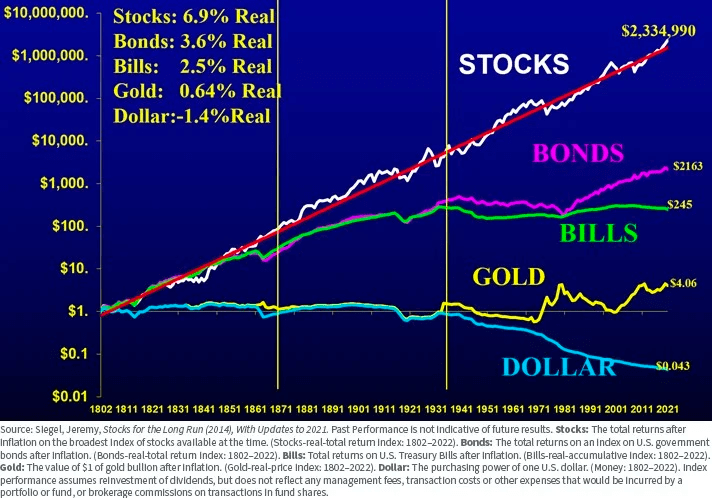Compound Interest
A = Final Amount after n yearsP = Principal valuer = Annual rate of returnn = Number of years money is investedMost of us learnt Compound Interest in school but very few realized its full potential in real life.Albert Einstein said "Compound interest is the eighth wonder of the world. He who understands it, earns it … he who doesn't … pays it.”"My wealth has come from a combination of living in America, some lucky genes, and compound interest." - Warren BuffettCompound works like magic in investing. Investment decisions shall be made based on probabilities of achieving higher risk adjusted returns over a longer period of time.What helps achieve better results?1) Present Value [PV] - Looking back at equation, investing larger initial sum of money can yield good result as future value compounds based on Present investment2) Rate of Return [r] : Higher rate of returns compound money at better rate.3) Long Life [n] : This is least understood and most powerful. Letting your investment run for a prolonged time outruns anything. On observing closely, "n" has exponential impact [raised to n].RULE of 72 : Dividing the number 72 by rate of return doubles money. Example : If someone can earn 18% annual return on their investment, then principal amount can double in 4 years [72/4].What does it all mean? How to compound money?There's a great book, Stocks for the Long Run by Jeremy Siegel. He published results of inflation adjusted returns from Stocks, Bonds, Bills, Gold and Cash from 1802 to 2021 [below chart].Stocks outperformed all asset classes since last ~220 years. Stocks are nothing but representation of business. If business sells more products and services, it can earn more money, which implies more employment. If the economy has more employment, employees can buy Real estate, Bonds, Gold or Treasury Bills. Hence it's no surprise that returns of stocks outpace all asset classes over the long period.When accounting for inflation, gold's value increased from $1 to $4, while stocks experienced growth from $1 to $2.334 million.These calculations reveal that stocks exhibit an average annualized appreciation over inflation of 6.9%, far surpassing gold's modest 0.64% over inflation.While gold is commonly considered a secure store of value, it falls short as a dynamic investment. On the other hand, cash proves to be an unreliable store of value, with its purchasing power diminishing significantly. Over the last 220 years, the value of $1 has eroded to a mere $0.04, equivalent to 4 cents, when adjusted for inflation.Compound interest operates on a straightforward principle: it's the interest earned not only on your initial deposit but also on the interest continually accumulating. This mechanism accelerates the growth of your savings over time.Compound interest and compounding have the potential to significantly enhance your savings and fortify your retirement prospects.
It's important to recognize that successful investing hinges more on possessing the right temperament than on exceptional intelligence. Maintaining composure when others may panic puts you at an advantage. As you embark on the journey of building wealth, remember that gradual and steady progress is the hallmark of success.
In matters of compounding, the earlier you commence, the more extended runway you secure.
So, why wait? Begin your wealth-building journey today!

